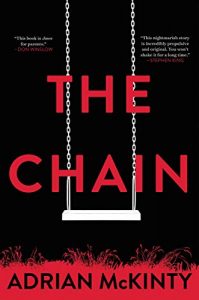Looking for something to read in your downtime, during your lunchtime, or before your bedtime? Well, the Furman Libraries have recently acquired some exciting new titles that may be of interest to you.
New Fiction:
A stranger has kidnapped your child.
To free them you must abduct someone else’s child.
Your child will be released when your victim’s parents kidnap another child.
If any of these things don’t happen:
Your child will be killed.
YOU ARE NOW PART OF THE CHAIN
The Enlightenment of Bees / Rachel Linden
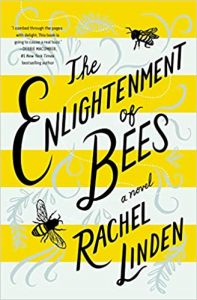 At twenty-six, apprentice baker Mia West has her entire life planned out: a Craftsman cottage in Seattle, a job baking at The Butter Emporium, and her first love—her boyfriend, Ethan—by her side. But when Ethan declares he “needs some space,” Mia’s carefully planned future crumbles.
At twenty-six, apprentice baker Mia West has her entire life planned out: a Craftsman cottage in Seattle, a job baking at The Butter Emporium, and her first love—her boyfriend, Ethan—by her side. But when Ethan declares he “needs some space,” Mia’s carefully planned future crumbles.
Feeling adrift, Mia joins her vivacious housemate Rosie on a humanitarian trip around the world funded by a reclusive billionaire. Along with a famous grunge rock star, a Rwandan immigrant, and an unsettlingly attractive Hawaiian urban farmer named Kai, Mia and Rosie embark on the adventure of a lifetime.
From the slums of Mumbai to a Hungarian border camp during the refugee crisis, Mia’s heart is challenged and changed in astonishing ways—ways she never could have imagined. As she grapples with how to make a difference in a complicated world, Mia realizes she must choose between the life she thought she wanted and the life unfolding before her.
The Turn of the Key / Ruth Ware
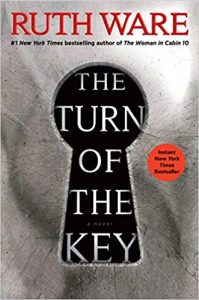 When she stumbles across the ad, she’s looking for something else completely. But it seems like too good an opportunity to miss – a live-in nannying post, with a staggeringly generous salary. And when Rowan Caine arrives at Heatherbrae House, she is smitten – by the luxurious “smart” home fitted out with all modern conveniences, by the beautiful Scottish Highlands, and by this picture-perfect family.
When she stumbles across the ad, she’s looking for something else completely. But it seems like too good an opportunity to miss – a live-in nannying post, with a staggeringly generous salary. And when Rowan Caine arrives at Heatherbrae House, she is smitten – by the luxurious “smart” home fitted out with all modern conveniences, by the beautiful Scottish Highlands, and by this picture-perfect family.
What she doesn’t know is that she’s stepping into a nightmare – one that will end with a child dead and herself in prison awaiting trial for murder.
Writing to her lawyer from prison, she struggles to explain the unravelling events that led to her incarceration. It wasn’t just the constant surveillance from the cameras installed around the house, or the malfunctioning technology that woke the household with booming music, or turned the lights off at the worst possible time. It wasn’t just the girls, who turned out to be a far cry from the immaculately behaved model children she met at her interview. It wasn’t even the way she was left alone for weeks at a time, with no adults around apart from the enigmatic handyman, Jack Grant.
It was everything.
She knows she’s made mistakes. She admits that she lied to obtain the post, and that her behavior toward the children wasn’t always ideal. She’s not innocent, by any means. But, she maintains, she’s not guilty – at least not of murder. Which means someone else is.
Full of spellbinding menace and told in Ruth Ware’s signature suspenseful style, The Turn of the Key is an pause-resisting thriller from the Agatha Christie of our time.
Who Fears Death / Nnedi Okorafor
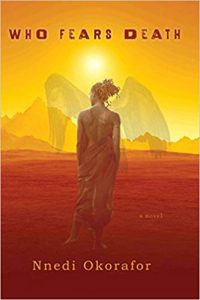 In a post-apocalyptic Africa, the world has changed in many ways; yet in one region genocide between tribes still bloodies the land. A woman who has survived the annihilation of her village and a terrible rape by an enemy general wanders into the desert, hoping to die. Instead, she gives birth to an angry baby girl with hair and skin the color of sand. Gripped by the certainty that her daughter is different—special—she names her Onyesonwu, which means “Who fears death?” in an ancient language.
In a post-apocalyptic Africa, the world has changed in many ways; yet in one region genocide between tribes still bloodies the land. A woman who has survived the annihilation of her village and a terrible rape by an enemy general wanders into the desert, hoping to die. Instead, she gives birth to an angry baby girl with hair and skin the color of sand. Gripped by the certainty that her daughter is different—special—she names her Onyesonwu, which means “Who fears death?” in an ancient language.
It doesn’t take long for Onye to understand that she is physically and socially marked by the circumstances of her conception. She is Ewu—a child of rape who is expected to live a life of violence, a half-breed rejected by her community. But Onye is not the average Ewu. Even as a child, she manifests the beginnings of a remarkable and unique magic. As she grows, so do her abilities, and during an inadvertent visit to the spirit realm, she learns something terrifying: someone powerful is trying to kill her.
Desperate to elude her would-be murderer and to understand her own nature, she embarks on a journey in which she grapples with nature, tradition, history, true love, and the spiritual mysteries of her culture, and ultimately learns why she was given the name she bears: Who Fears Death.
New Non-Fiction:
Survival Math: Notes on an All-American Family / Mitchell Jackson
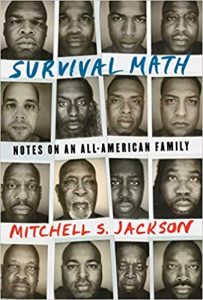 This dynamic book explores gangs and guns, near-death experiences, sex work, masculinity, composite fathers, the concept of “hustle,” and the destructive power of addiction—all framed within the story of Jackson, his family, and his community. Lauded for its breathtaking pace, its tender portrayals, its stark candor, and its luminous style, Survival Math reveals on every page the searching intellect and originality of its author. The primary narrative, focused on understanding the antecedents of Jackson’s family’s experience, is complemented by poems composed from historical American documents as well as survivor files, which feature photographs and riveting short narratives of several of Jackson’s male relatives. The sum of Survival Math’s parts is a highly original whole, one that reflects on the exigencies—over generations—that have shaped the lives of so many disenfranchised Americans. As essential as it is beautiful, as real as it is artful, Mitchell S. Jackson’s nonfiction debut is a singular achievement, not to be missed.
This dynamic book explores gangs and guns, near-death experiences, sex work, masculinity, composite fathers, the concept of “hustle,” and the destructive power of addiction—all framed within the story of Jackson, his family, and his community. Lauded for its breathtaking pace, its tender portrayals, its stark candor, and its luminous style, Survival Math reveals on every page the searching intellect and originality of its author. The primary narrative, focused on understanding the antecedents of Jackson’s family’s experience, is complemented by poems composed from historical American documents as well as survivor files, which feature photographs and riveting short narratives of several of Jackson’s male relatives. The sum of Survival Math’s parts is a highly original whole, one that reflects on the exigencies—over generations—that have shaped the lives of so many disenfranchised Americans. As essential as it is beautiful, as real as it is artful, Mitchell S. Jackson’s nonfiction debut is a singular achievement, not to be missed.
 In 1941 a thirty-one-year-old Frenchwoman, a young mother born to privilege and known for her beauty and glamour, became the leader of a vast intelligence organization—the only woman to serve as a chef de résistance during the war. Strong-willed, independent, and a lifelong rebel against her country’s conservative, patriarchal society, Marie-Madeleine Fourcade was temperamentally made for the job. Her group’s name was Alliance, but the Gestapo dubbed it Noah’s Ark because its agents used the names of animals as their aliases. The name Marie-Madeleine chose for herself was Hedgehog: a tough little animal, unthreatening in appearance, that, as a colleague of hers put it, “even a lion would hesitate to bite.”
In 1941 a thirty-one-year-old Frenchwoman, a young mother born to privilege and known for her beauty and glamour, became the leader of a vast intelligence organization—the only woman to serve as a chef de résistance during the war. Strong-willed, independent, and a lifelong rebel against her country’s conservative, patriarchal society, Marie-Madeleine Fourcade was temperamentally made for the job. Her group’s name was Alliance, but the Gestapo dubbed it Noah’s Ark because its agents used the names of animals as their aliases. The name Marie-Madeleine chose for herself was Hedgehog: a tough little animal, unthreatening in appearance, that, as a colleague of hers put it, “even a lion would hesitate to bite.”
No other French spy network lasted as long or supplied as much crucial intelligence—including providing American and British military commanders with a 55-foot-long map of the beaches and roads on which the Allies would land on D-Day—as Alliance. The Gestapo pursued them relentlessly, capturing, torturing, and executing hundreds of its three thousand agents, including Fourcade’s own lover and many of her key spies. Although Fourcade, the mother of two young children, moved her headquarters every few weeks, constantly changing her hair color, clothing, and identity, she was captured twice by the Nazis. Both times she managed to escape—once by slipping naked through the bars of her jail cell—and continued to hold her network together even as it repeatedly threatened to crumble around her.
Now, in this dramatic account of the war that split France in two and forced its people to live side by side with their hated German occupiers, Lynne Olson tells the fascinating story of a woman who stood up for her nation, her fellow citizens, and herself.
 From a woman who has been there and back, the first inside look at the devastating effects evangelical Christianity’s purity culture has had on a generation of young women—in a potent combination of journalism, cultural commentary, and memoir.
From a woman who has been there and back, the first inside look at the devastating effects evangelical Christianity’s purity culture has had on a generation of young women—in a potent combination of journalism, cultural commentary, and memoir.
In the 1990s, a “purity industry” emerged out of the white evangelical Christian culture. Purity rings, purity pledges, and purity balls came with a dangerous message: girls are potential sexual “stumbling blocks” for boys and men, and any expression of a girl’s sexuality could reflect the corruption of her character. This message traumatized many girls—resulting in anxiety, fear, and experiences that mimicked the symptoms of Post-Traumatic Stress Disorder—and trapped them in a cycle of shame.
This is the sex education Linda Kay Klein grew up with.
Fearing being marked a Jezebel, Klein broke up with her high school boyfriend because she thought God told her to, and took pregnancy tests though she was a virgin, terrified that any sexual activity would be punished with an out-of-wedlock pregnancy. When the youth pastor of her church was convicted of sexual enticement of a twelve-year-old girl, Klein began to question the purity-based sexual ethic. She contacted young women she knew, asking if they were coping with the same shame-induced issues she was. These intimate conversations developed into a twelve-year quest that took her across the country and into the lives of women raised in similar religious communities—a journey that facilitated her own healing and led her to churches that are seeking a new way to reconcile sexuality and spirituality.
Sexual shame is by no means confined to evangelical culture; Pure is a powerful wake-up call about our society’s subjugation of women.
What My Mother and I Don’t Talk About: Fifteen Writers Break the Silence / Michele Filgate
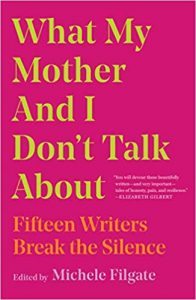 As an undergraduate, Michele Filgate started writing an essay about being abused by her stepfather. It took her more than a decade to realize what she was actually trying to write: how this affected her relationship with her mother. When it was finally published, the essay went viral, shared on social media by Anne Lamott, Rebecca Solnit, and many others. The outpouring of responses gave Filgate an idea, and the resulting anthology offers a candid look at our relationships with our mothers.
As an undergraduate, Michele Filgate started writing an essay about being abused by her stepfather. It took her more than a decade to realize what she was actually trying to write: how this affected her relationship with her mother. When it was finally published, the essay went viral, shared on social media by Anne Lamott, Rebecca Solnit, and many others. The outpouring of responses gave Filgate an idea, and the resulting anthology offers a candid look at our relationships with our mothers.
While some of the writers in this book are estranged from their mothers, others are extremely close. Leslie Jamison writes about trying to discover who her seemingly perfect mother was before ever becoming a mom. In Cathi Hanauer’s hilarious piece, she finally gets a chance to have a conversation with her mother that isn’t interrupted by her domineering (but lovable) father. André Aciman writes about what it was like to have a deaf mother. Melissa Febos uses mythology as a lens to look at her close-knit relationship with her psychotherapist mother. And Julianna Baggott talks about having a mom who tells her everything.
As Filgate writes, “Our mothers are our first homes, and that’s why we’re always trying to return to them.” There’s relief in breaking the silence. Acknowledging what we couldn’t say for so long is one way to heal our relationships with others and, perhaps most important, with ourselves.
Contributors include Cathi Hanauer, Melissa Febos, Alexander Chee, Dylan Landis, Bernice L. McFadden, Julianna Baggott, Lynn Steger Strong, Kiese Laymon, Carmen Maria Machado, André Aciman, Sari Botton, Nayomi Munaweera, Brandon Taylor, and Leslie Jamison.

